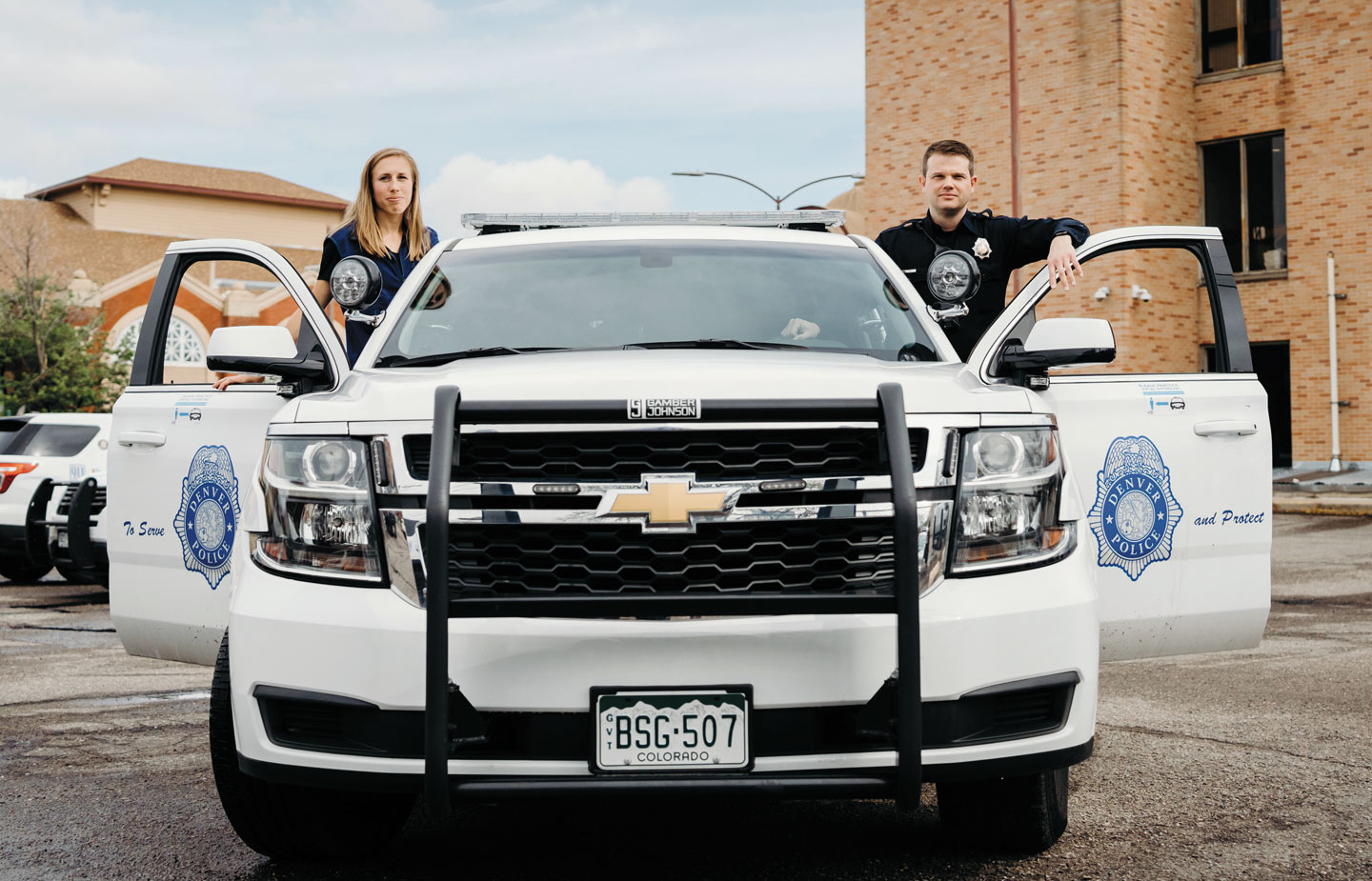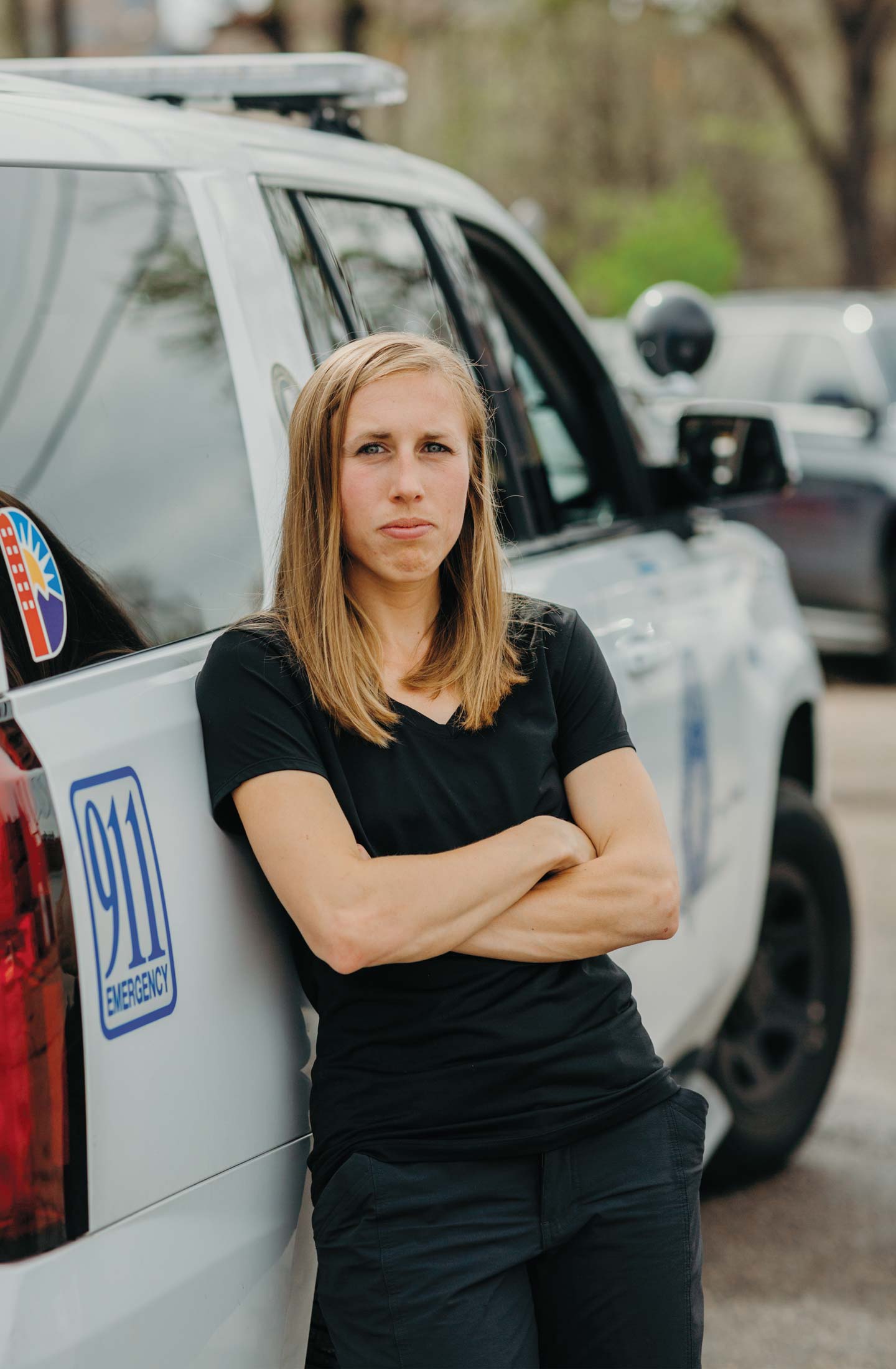Ride Along
Kathy Evans ’14 is among a growing number of mental health professionals who patrol with police officers to assist citizens in crisis and help de-escalate police encounters.
Afew days into her new job, Kathy Evans ’14 encountered a person trying to jump off a balcony.
Some days, Evans might end up at the scene of a drug overdose or a burglary. She was recently involved in a car chase through the streets of Denver.
“My knuckles were white; I was definitely practicing my deep breathing,” Evans said.
Evans isn’t a detective, an investigator or a patrol officer. She is a licensed clinical social worker who rides along with police officers to assist people in need, de-escalate encounters between the general public and the police, and divert citizens into treatment rather than the criminal justice system.
At a time when many communities across the country are looking to reimagine public safety, the co-responder model is gaining popularity. And for good reason: It’s a straightforward way to mitigate the overreliance on police to respond to matters that aren’t criminal in nature.
“In Denver, 41 percent of the emergency calls are mental health related and have nothing to do with crime. These are people who just need resources,” Evans said.
Ronald Davis served as a police officer for 30 years and as the director of the U.S. Department of Justice’s Office of Community Oriented Policing Services under the Obama administration. During a virtual event in January, he spoke about the dangers of relying solely on police to address social issues, in “Continuing the Conversation on Race: Policing in the U.S. and New London,” hosted by Connecticut College and The Day newspaper.
“Over the past 20 to 30 years, we have deconstructed most of the social services capacity in our communities, whether it’s mental health services, drug addiction services, reentry services—and that one 24-hour entity, the police, is the only one left to respond. … It criminalizes activities that should not be criminalized,” he said.
“Homelessness is not a crime. Addiction is not a crime. Mental illness is not a crime. [Police officers] need to get out of that business.”
That’s where Evans and her fellow clinicians come in.
“I work with fantastic officers who have the community’s best interest in mind and want to help people, but they don’t always have the training I have,” she said. “They aren’t prepared to deal with certain mental health issues, and they don’t have the resources. That’s why it’s so great we have this partnership—we can collaborate. We can support each other.”
A CO-RESPONDER
Evans’ day starts at 6 a.m. with roll call. Clinicians and officers discuss any large public events planned for the day and follow up on previous activity or other pertinent issues. Then, Evans puts on her bulletproof vest and hops into a police car.
“The calls can be so unpredictable, and even when they don’t initially seem to be related to mental health, they often are,” Evans says.
She uses a car accident as an example—a two-car accident on a busy road doesn’t sound like something that would require a social worker, but once on scene, Evans might realize that the person driving erratically was doing so because they were experiencing mental distress.
“I’ve been on calls where I’ve been able to say, ‘Hey, this is impacting your ability to drive safely, and we should really talk about that. I could help you find resources and get connected to mental health services.’ The person ends up really benefiting.”
Some calls are clearly mental health related, such as a person considering suicide or someone with schizophrenia acting aggressively toward a family member. In those cases, after her partner officer has made sure the scene is safe, Evans often takes the lead. Other calls are related to addiction—fentanyl overdose is especially common in the Denver area—or homelessness. In some instances, Evans aids distraught family members, witnesses or victims.
“I go on a lot of calls where family members have found loved ones who have passed away. The officers have their job they need to do, but when I’m on scene, I can provide support for people who may have found the body, for example.”
After providing on-scene assistance, Evans connects the people she encounters—called clients—with a network of resources and services through the Mental Health Center of Denver. She collaborates with case managers, hospital staff and service providers to make sure people get the follow-up care they need.

